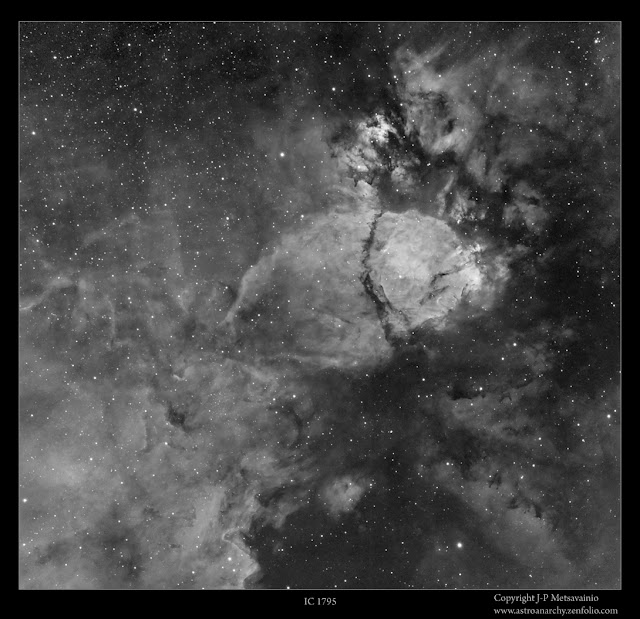COPYRIGHT, PLEASE NOTE
All the material on this website is copyrighted to J-P Metsavainio, if not otherwise stated. Any content on this website may not be reproduced without the author’s permission.
BUY A MUSEUM QUALITY POSTER
BUY A POSTER:https://astroanarchy.zenfolio.com/
Saturday, April 18, 2015
B&W space, Winter 2014-15
As astronomical cameras are usually cooled grayscale CCD-cameras, color images are made by shooting each color channel through a filter. For broad band RGB images usually four filters are used Luminance and RGB-filters. Due to massive light pollution in my location, I'm specialized to a narrowband imaging, it's very effective method to shoot emission nebulae, since they are emitting light in well known wavelengths. All other light can be then filtered out and let just the right wavelength pass through. I'm using the most common combination of emission lines, a light from ionized hydrogen (H-alpha), sulfur (S-II) and oxygen (O-III).
The strongest emission line is usually the H-alpha, it has most of the details also. I'm publishing here a collection of H-alpha images from the Winter season 2014-15. Sometimes B&W images can be very beautiful.
A collection of selected B&W H-alpha nebulae, Winter 2014-15
click for a large imagePelican Nebula
Pelican Nebula mosaic, a blog post HERE
Pickering's Triangle in O-III light only
Pickering's Triangle in O-III light only, a blog post HERE
NGC 281
NGC 281, a blog post HERE
Sharpless 132
Sharpless 132, Sh2-132, a blog post HERE
Tulip Nebula
The Tulip Nebula, Sh2-101, a blog post HERE NASA APOD
IC 405
IC 405, the Flaming Star Nebula, a blog post HERE
IC 410
IC 410, a blog post HERE
IC 1805
IC 1805, The Heart Nebula, a blog post HERE
Melotte 15
Melotte 15 inside IC 1805, a blog post HERE
NGC 1795

NGC 1795, a blog post HERE
NGC 2175
NGC 2175, The Monkey Head Nebula, a blog post HERE
Subscribe to:
Post Comments (Atom)



















No comments:
Post a Comment